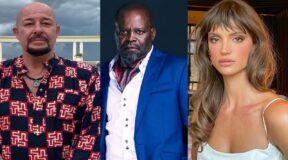Saudi was born Anele Mbisha in the Soweto township of Senaone, South Africa, to a family with a vast record collection and a passion for music. He grew up idolizing Nina Simone and Michael Jackson, whose work motivated him to seek a career in music, and he recorded his first song at the age of thirteen.
Personal information

Full name: Anele Mbisha
Date of birth: 1997 (24 years of age)
Place of birth: Soweto, Gauteng, South Africa
Mother: Carmelia Mngomezulu
Girl friend: Nthabiseng Nketsi (22)
Occupation: Rapper, Singer-songwriter and Record producer
Nationality: South African
Saudi joined the O.V.L.O.E. rap collective in 2011 and began to build his own style, which he dubbed “Japan Four,” which combined Afro rhythms with trap and R&B. He joined to the Ambitiouz label in South Africa, and his debut single “There She Go” was released in 2016. D.R.U.G.S INC., his first long-player, was released in the winter of 2017.
The next year, the young rapper was featured on the Black Panther soundtrack, which was produced and curated by Kendrick Lamar. 2 Chainz and Schoolboy Q also appear on “X,” while the majority of Saudi’s verses were in Zulu.
How he began his music/rap career
Saudi (24) began rapping while he was barely ten years old. He recorded his first song on an electronic piano when he was 13 years old, and by the time he was in high school at Eldorado Park Secondary, he had created Ozmuzik Victory Lane Over Everything, a rap group.

When he learned that his mother, Carmelia Mngomezulu, didn’t have enough money to keep sending him and his brothers, Loyiso (27) and Nomathibane (19), to school, his developing hip-hop career came to an abrupt halt.
He opted to drop out of school while he was in Grade 11 in order to aid his family. “My mother was breaking her back trying to provide her kids,” he says. “I realised it was up to me to make my own way and help get my family out of debt, poverty and despair.
“I sold drugs to help my mother. It was the only way I knew. This was the life I was exposed to in the township,” he says, referring to Senaoane, in Soweto, where he grew up.
Soon after, he was living on the streets.
“My mother and grandmother taught me great morals and principles but that all evaporated once I got involved in street life. To this day I live by checks and stripes – which means money and maintaining a respected and even feared reputation.”
He also started using drugs, he admits.
“It was a hard life for a kid and it all got too much.
“At some point I wanted to kill myself because I couldn’t take it anymore. I wanted to end it all. But music saved me.”
Dr Nyasha Mugari on Scandal etv by Jerome Galiao
How things turned around
When he met music producers Ruff and the late Swati in 2012 at the DogMow Studio in the Jozi CBD, where the African Trap Movement was created, he was granted a second chance. He also met Emtee and Sjava, two other recording artists he refers to as “brothers.”

The group shared a flat in Jozi’s central business district, where they wrote “some of their best tunes.”
Emtee recorded Washa in that flat, which led to the rapper being signed to Ambitiouz Records in 2015. Emtee, according to Saudi, didn’t forget about his friends. He presented Saudi to the label’s owner, Kgosi Mahumapelo, who also signed him. Amafu by Sjava, as well as Africa, a song from Saudi’s debut album, and We Up by Emtee, were all recorded in their flat.
“Ruff became my mentor. It was the first time I’d met someone who believed in me. He didn’t judge me or lie to me.”
Emtee and Sjava inspire him, he says. “I feed off their energy. Together we make sense, we fight to be the best.”
Going back to School
Saudi went back to school, matriculated and briefly attended a music college before dropping out. “I realised it wasn’t going to help me become the best and most lucrative artist in the world, which is my current goal.”
He does, however, intend to someday get a degree in psychology so that when he has kids he can show them the value of education.
“I won’t give [my kids] an excuse to not complete school.”
Despite his fame and success, the rapper describes himself as a “socially awkward and broken, but good-hearted person. This is who I am and there is nothing I can do about it. Life goes on.”
Perspective on life
He confesses that he has profound trust difficulties, adding that he has been wary of people since he was a child.
“I grew up believing that life was unjust. I went to see a therapist, but I don’t believe that therapists can help you. “It’s pointless since so many people are prejudiced already,” he says.
On his 2017 album, Drugs Inc, he explored his inner world, although he claims the album’s title received more attention than the content.
“The title is an acronym, for Devil’s Revenge Upon God’s Servant is Not Crime, which sums up my upbringing and life experiences . . . But people misunderstood my album’s name. I don’t glorify drugs at all,” he told TimesLive.
Saudi’s girl friend
The one person who does understand him is his girlfriend, Nthabiseng Nketsi (22). The couple have been together since 2016, Saudi says. “She is my best friend. She is always there for me. Nketsi is the realest person I know. She gets me.”
Blxckie: Sihle Sithole detailed biography
Encounter with Kendrick Lamar and the Black Panther Soundtrack
Cape Town (South Africa) – He sold narcotics on the streets of Soweto as a juvenile hustler to assist his family survive. It was a hard life, and when Anele Mbisha was 16 years old, he considered taking his own life to escape the sadness that had surrounded him.
But he persevered, and it’s a good thing he did since he was a part of a global success story, performing alongside superstar Kendrick Lamar on the record-breaking soundtrack for the popular film Black Panther.
Saudi, Anele’s new stage identity, is the first to say that he’s still “just a chill dude from ekasi.” And, while he enjoyed the chance to work on such a prominent project, it hasn’t made a significant difference in his life.
He recalls, “I was humbled that Kendrick noticed some promise in this boy from Soweto.” “However, it had no bearing on my career.”
Saudi claims Kendrick was familiar with his songs and approached his record label, Ambitiouz Entertainment, with the idea of working together. “He was a fan of my music and was aware of it.”
Lesego Mnyandu: Flvme’s full life Story
Validation from Kendrick Lamar
Kendrick gave him freedom to do his verse for the track in his style. And when his sound became part of the award-winning soundtrack for the hit movie, Saudi was thrilled.
“It felt good knowing I’m part of something that successful. I didn’t have any high expectations but the whole experience was a positive shift in my career.” However, his management team should have capitalised on the huge Black Panther hype to push his brand internationally, he adds.
Still, it is what it is and he doesn’t blame anyone.
“I’m just saying the album didn’t do anything for me. And Kendrick didn’t have to do anything for me – he’s not my father.
“I am the only person who cares about where I come from and where I want to be. And I want to be the best, the most influential, lucrative and successful artist. I am always fighting to achieve that.”





